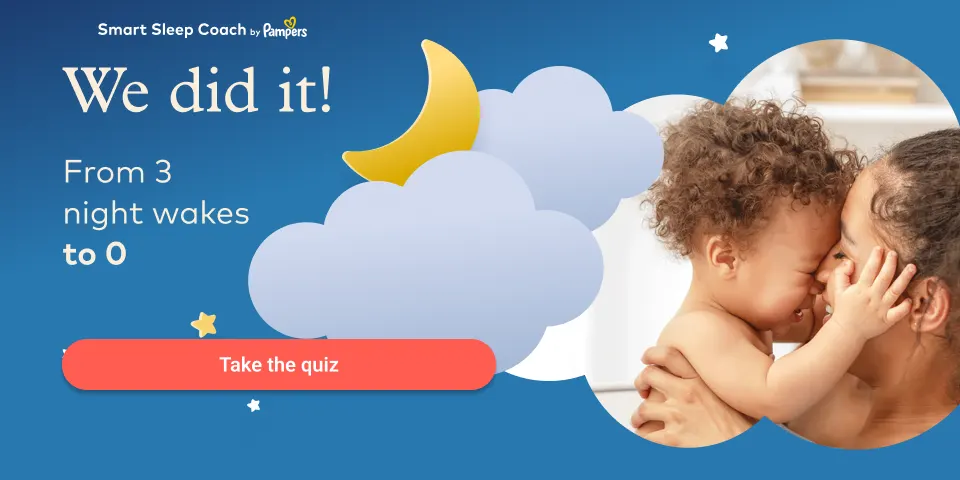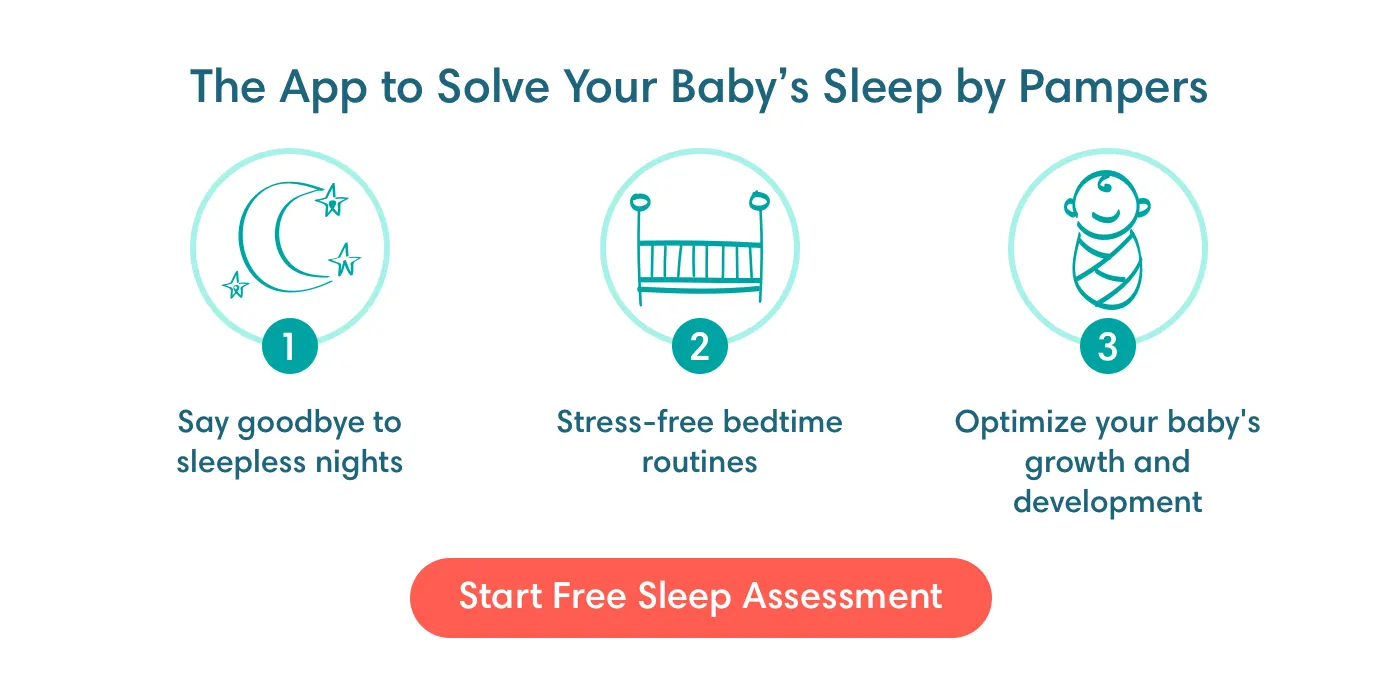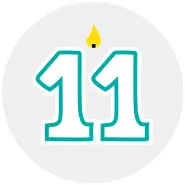12-Month-Old Baby: Your Baby's First Birthday!
Can you believe it's been a year? Your little one has reached the 12-month point, and there's so much to be excited about now! He's becoming more capable of feeding and expressing himself, and, if he hasn't already, he's gearing up to take those all-important first steps. At this point, his diet may change slightly, and sleeping through the night may be a bit of a challenge, but he's learning more about his world every day. Learn more about what's in store for you and your 12-month-old baby this month.

Baby Development Milestones
You're bound to experience a wave of 12-month-old baby milestones this month, and his first words and steps may be just around the corner, too. He's gaining independence from his new mobility, whether he’s crawling, scooting, cruising (walking while holding on to furniture for support), or walking already. Your baby may also be starting to form the sounds and syllables that will eventually become words.
Growth and Physical Development: Keep Watching Him Grow
Your baby's done a lot of growing in the last 12 months! In fact, by his first birthday, it's possible that he's tripled his birth weight, and may stand at an impressive 28 to 32 inches tall. Know that babies' growth tends to slow down a bit around their first birthday, but you can always check the growth charts that your baby's healthcare provider uses to make sure he's progressing as expected. The same charts are often used to track growth until the age of 24 months.
As your little one starts taking his first few tentative steps, you may notice his feet are turned outward. This is normal and should correct itself naturally. As he gets stronger on his feet in coming months, the ligaments of his hips will tighten and his feet will start to point forward.
Dental hygiene is important at this time, too. Experts advise that you make your baby's first dental appointment when his first tooth comes in, but certainly by his first birthday. Once those first teeth start appearing, make sure to brush them gently twice a day, and focus on weaning him off the bottle around his first birthday to help prevent tooth decay. There is a lot of variation among babies as to when their first teeth start to appear, so don't worry so much about how many teeth he may or may not have at this point and focus more on oral hygiene.
Senses: Bright-eyed and Curious
By now, your 12-month-old baby's vision has reached normal adult levels and is sharper than ever. He can now see just as clearly as you can! You may notice his hand-eye coordination is improving, too. His vision and motor skills may now allow him to reach for and pick up specific objects and even feed himself with greater control. He might be more able to focus on small details at this point, and may be able to handle small pieces of food more easily, for example. It's also likely that more food is ending up in his mouth than on the floor as he becomes more skilled at guiding finger foods or maybe a spoon to his mouth and using a sippy cup.
Movement: Cruising and Balancing
Those first wobbly steps are among the more exciting 12-month-old baby milestones your baby may be accomplishing around this time, or in the next month or two. By this age, your little one may be a pro at pulling himself into a standing position and even taking steps while holding onto furniture (known as cruising). His balance is improving, so you may see him let go of the furniture or your hands and take two or three steps on his own, without support. He'll lose his balance and drop to the floor from time to time, but as long as you've provided a safe space for these early steps, it's all part of the learning process. Most babies only stumble for a short time before finding their footing and walking with confidence.
Cognitive Development: Practicing Sounds and Words
By now, your baby can imitate gestures and point or crawl toward something he wants. He’s also working hard on getting to the point where he’ll be able to communicate what he’d like with basic words. For example, he's experimenting with sounds, and you may find he's able to make some recognizable syllables like “ma,” “ga,” or “ba.” These are all stepping stones toward his first real words. You may be eagerly awaiting what his first word will be, but keep in mind all babies are different and start speaking at different times. Keep talking and reading to him, and you'll inspire him to practice more sounds and eventually try to communicate with you.

How to Support Your Baby's Development
There are endless ways to help stimulate your 12-month-old baby’s curiosity and nurture his development. Talk to your baby as you go about your day, and don't forget about playing and reading together, too. Stick to your established routines for bedtime, mealtime, and playtime. For example, if your baby enjoys a story before bedtime or some dedicated playtime on the floor with you, make sure you make these comforting activities part of your daily schedule. Check out our video guides for more tips on how to make bedtime easier. If a caregiver is spending time with your child, make sure he or she follows your family's routines, too.
Playtime should be fun for both you and your baby as it gives him an opportunity to work on important skills. Here are a few ideas to keep in mind:
Let him play with soft blocks or other stackable toys to help improve his coordination and motor skills. At this stage, 12-month-old baby toys don't need to be sophisticated or pricey: Sometimes household items like bowls are just as interesting to him as fancy, big-ticket items.
Play peekaboo together. This simple game provides endless entertainment for your baby, and it helps him understand object permanence, the idea that objects continue to exist even when we can't see them.
Development experts recommend restricting screen time and access to digital devices for your baby's first two years. Be careful with “background media,” such as your phone and the television, as anything that has your attention takes attention away from your baby. It's a good idea to put down your phone and switch off the television when your baby is awake as much as possible.

Feeding Your 12-Month-Old Baby
After your baby's first birthday, you can start to introduce him to cow's milk — either whole milk or reduced fat (2 percent) milk — and phase out formula. You can, however, continue to breastfeed on demand if your baby wants to do so. To start the transition from formula to cow's milk, simply replace bottles or sippy cups of formula with bottles of cow's milk. Start offering cow's milk gradually, working up to 2 and 3 cups of milk each day. If you notice any symptoms like hives, wheezing, vomiting, or diarrhea within hours or days of your baby's first taste of cow's milk, contact your baby's healthcare provider, who may conduct some tests to determine if your baby has a milk allergy.
He may also be less interested in baby foods now and more interested in what’s happening and being eaten at the family dinner table, so you could start to offer him more foods with different flavors and textures, and share some of your meals with him, whether that's small pieces of steamed veggies or pieces of pasta. Just make sure any adult food is unseasoned (babies don't need salt) and mashed or cut into pieces to prevent choking hazards.
You're probably also noticing that he's getting better at working with finger foods and feeding himself, making mealtimes a bit less messy. If he doesn't seem particularly excited about a new food, keep in mind it can take as many as 10 to 15 attempts before a child can truly decide whether or not he likes a certain food or flavor.
Now that your baby is enjoying a wider variety of foods, including cow's milk, you may notice the frequency and consistency of his poopy diapers will change. Don't worry unless he has diarrhea or shows signs of constipation, which can include hard stools, or if he shows signs of distress when making a bowel movement if he's constipated, and a greater liquid content if he has diarrhea. It's great if he's enjoying new foods, but keep in mind about half of his caloric intake should still come from breast milk or formula (about 24 ounces per day), while the rest can come from his new favorite table foods.
If you haven't already, now is a great time to sign up for Pampers Rewards. Earn points each time you buy a Pampers product, and redeem your points for gifts, toys, discounts, and coupons.

How Much Sleep Does a 12-Month-Old Baby Need?
At this age, your baby needs between 12 and 16 hours of sleep each day, which includes two daytime naps that can last between 30 minutes and two hours each. With any luck, she's sleeping for longer stretches at night, although if she's experiencing separation anxiety, she may be waking and crying from time to time. Learn more about how to deal with sleep disruptions.
To help you both get through these more challenging nights, here are a few tips for 12-month-old baby sleep success:
Stick to your bedtime routines. A bath, a story, and a lullaby are a few good soothing options, and it's helpful to try to do these activities at the same time every day, as consistency is often key to a good night's sleep.
Let her try to settle herself. If your baby wakes in the night, give her a few minutes to try to get herself back to sleep before you rush to her side.
Offer gentle reassurance. If she's upset in the night, you can offer some comforting words and do a quick diaper check. Don't turn on the lights and don't pick her up, and over time she'll learn to go back to sleep on her own.

Your Baby's Health: Breathing and Allergy Issues
From chronic conditions to temporary bouts of indigestion, there are a variety of ailments that could affect your baby. She may struggle digesting some of the new foods she's enjoying, and you may also notice some reactions to her environment, like sneezing or other allergy-like symptoms. The following are a few conditions to watch for:
Diarrhea and constipation. With all these new foods your baby is enjoying, including the possible addition of cow's milk to her diet, you may notice occasional diarrhea or constipation. If she cries when making a bowel movement or her stools seem hard, this can indicate constipation, so contact your baby's healthcare provider, who may suggest giving her extra water or fruit juice to help with hydration and soften her stools. It's especially important to let your baby's healthcare provider know if constipation comes with vomiting or fever.
Asthma. This chronic condition occurs when the airways in the lungs are inflamed and constricted. Asthma causes a distinct wheezing sound, usually at night or in the early morning hours. There may be a link to allergies, although it can even strike children with no known allergies. Asthma attacks are more likely when a child has a respiratory infection, like a cold, and can also be triggered by stress. It's a complex condition and symptoms can vary significantly from person to person. Contact your baby's healthcare provider if your baby has any wheezing episodes. Your provider can make a diagnosis and give you advice on how to confidently handle these episodes in the future.
Hay fever. A runny nose and red, itchy eyes are a few of the common symptoms of hay fever (or allergic rhinitis), which is a reaction to allergens like pollen, dust, mold, or pet hair. Although it has symptoms similar to those of a common cold, there are a few differences. With hay fever, you may notice a clear discharge from the nose, coughing, nosebleeds, dark circles under the eyes, and persistent throat clearing. If you suspect your baby may have hay fever, which tends to run in families, consult your baby's healthcare provider for a diagnosis and treatment options.

FAQS AT A GLANCE
A 12-month-old baby's weight varies, but most babies have tripled their birth weight. Remember that growth usually slows a bit in the months leading up to the first birthday.
Your Life as a Parent: Creating Lasting Memories
You likely have an array of pictures of your little one on your phone, but have you considered turning those snapshots into a more lasting memory? Consider making a scrapbook, photo book, memory box, or other keepsake to help you document and remember your baby's first year. Maybe you've kept your baby's hospital ID bracelet from when she was born, or you've been hanging onto a lock of hair from that very first haircut. Unique keepsakes like this are ideal to include; don't forget to add pictures of yourself and other family members from their time together with your baby. Here are some other ideas to help you mark this special birthday.
First Birthday Fun Gearing up for your little one's first birthday bash? It's an exciting milestone, and you'll certainly want to celebrate with your loved ones. One way to start the planning is by choosing a theme. You can go with a seasonal theme, so a garden party for your spring baby, or a festival fall theme for your fall baby. Or, you can take a cue from your baby's interests, and plan your theme around animals, cars, or anything else that catches your baby's attention. Once you have a theme in mind, it will make choosing invitations and decorations a bit easier. Then, consider your guest list: Will you keep it intimate and invite just close relatives and friends? Or will you plan a bigger party with neighbors, coworkers, and all their families, too? It's up to you what you choose, but the most important thing is to take lots of pictures, enjoy the day, and celebrate how far you've come as a parent and as a family!
How we wrote this article
The information in this article is based on the expert advice found in trusted medical and government sources, such as the American Academy of Pediatrics and the American College of Obstetricians and Gynecologists.
The content on this page should not replace professional medical advice. Always consult medical professionals for full diagnosis and treatment.
12 month old baby - checklist






